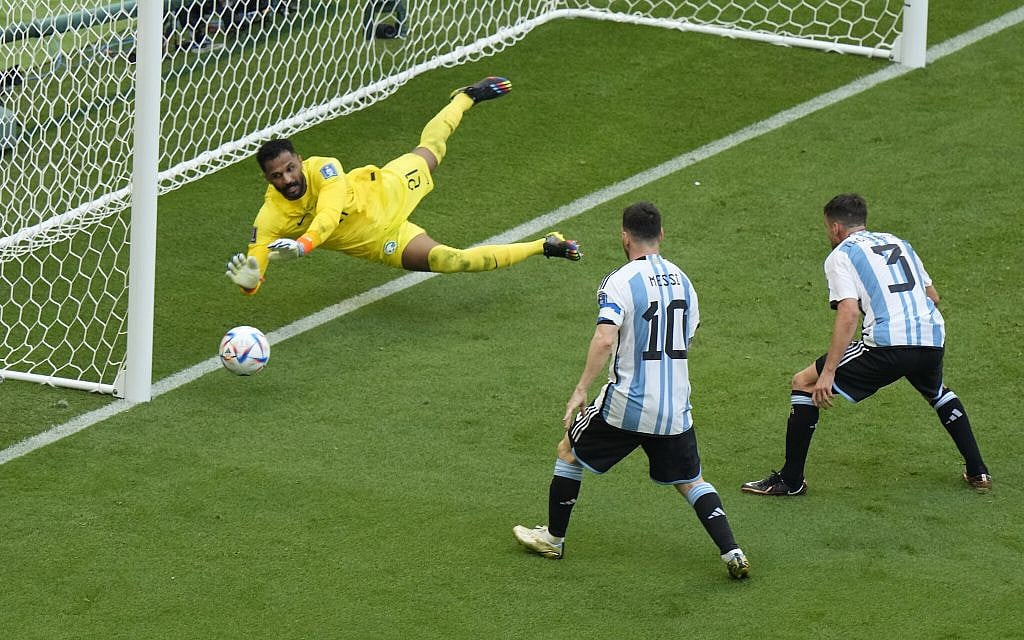Sportswashing
"[...] importantly, they [The Gulf States] learned that the money associated with sporting events, and the financial knock-on effects of hosting them, is an image purifier."

Listen to this article at Trinity Audio (Click here)- (officially associated with this Times of Israel blogs series)
Three years ago the UAE and Saudi Arabia, along with a few of their allies, were boycotting Qatar over Doha’s alleged ties to financing terrorism, and its friendly relationship with Iran. At that time, the Emiratis and the Saudis suggested that the boycott could potentially be lifted if Qatar forfeited hosting the World Cup this year.
Fast forward to November 2022, and the Saudis and Emiratis are among the biggest contingents of football fans traveling to Qatar for the event. UAE hotels have been expected to hit full capacity during the World Cup, as tourist bookings spill over from Doha.
It turns out that refusing to forfeit hosting the event was likely what broke the back of the boycott.
By January 2021, the Gulf States appeared to have fully comprehended the power of sports to mute political criticism. After all, it muted theirs. Saudi Arabia and the UAE learned first-hand that people’s love of sports generally surpasses their disapproval of dictatorship, corruption, and human rights abuse.
Perhaps more importantly, they learned that the money associated with sporting events, and the financial knock-on effects of hosting them, is an image purifier. The Gulf has realized that credibility is a purchasable commodity; nothing confirms this more than Qatar’s hosting of the World Cup.
Arguably, the UAE was the first of the Gulf States to explore the cleansing properties of sports, with Sheikh Mohammed bin Rashid Al Maktoum, the ruler of Dubai, making regular appearances at the English Derby, and establishing himself as British horseracing’s greatest benefactor. Sheikh Mohammed has poured billions of dollars into the sport, which employs nearly 20,000 people in the UK. In doing so, he has bought himself respectability among British elite society, where any discussion of the ruler’s controversies would have been simply impolite and awkward.
Abu Dhabi noticed the laundering effects of sports too, and began hosting UFC fights in 2010. Since then, the relationship with the MMA organization has blossomed and Abu Dhabi has cemented its position as a hub for the billion dollar sport.
Sports has proven to be a vehicle for soft power, and the Gulf is deploying that power vigorously. Saudi Arabia’s sovereign wealth fund recently purchased Newcastle United football club, the UAE owns Manchester City, and the Saudis also own Sheffield United. The UAE’s Etihad and Qatar Airways have major deals with European football clubs worth hundreds of millions of dollars. Dubai is even planning to open a Real Madrid theme park.
It should be understood that from a purely financial perspective, Gulf States’ investments in sporting events are, by definition, catastrophically unprofitable. Qatar has spent roughly $200 billion more than they will earn from the World Cup, but what countries like Qatar and the UAE are actually buying, of course, is immunity — and that is priceless.
About the Author
Radha Stirling founded Detained in Dubai and Due Process International in 2008 and has since helped and advised more than 15,000 (edit: april 2025 - over 20,000 individuals helpd, and advised) foreign nationals facing trouble in the UAE. Stirling is an expert witness, civil and criminal justice specialist, legislative, investment risk, business and policy advisor to the public and private sectors, speaker and host of the Gulf in Justice Podcast, covering regional issues in depth.

